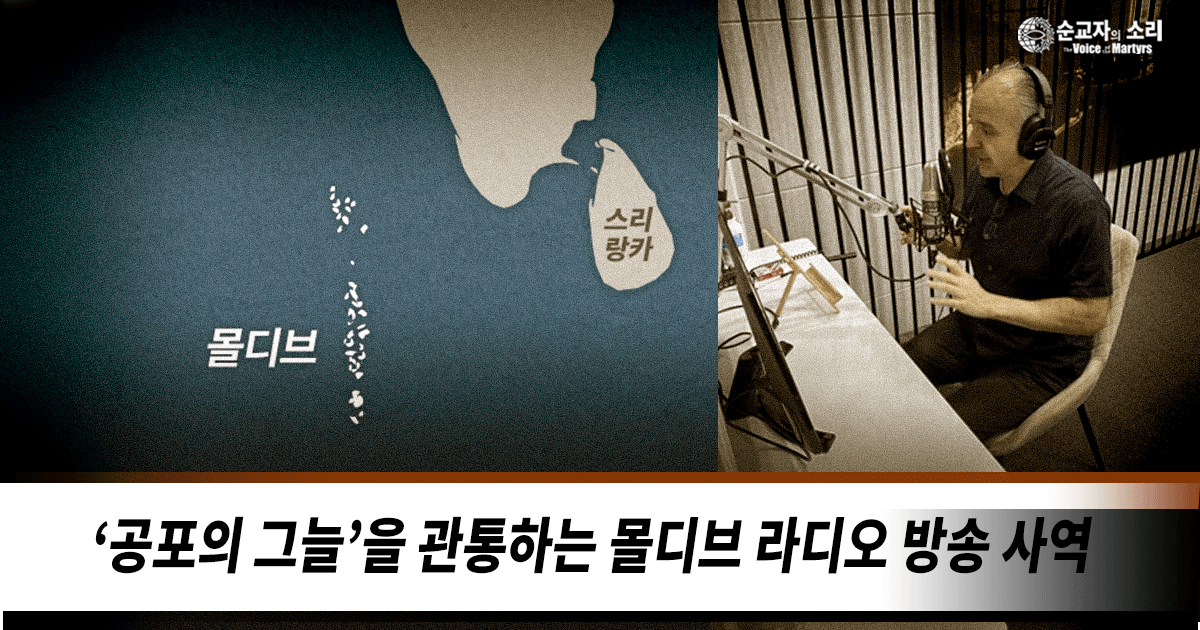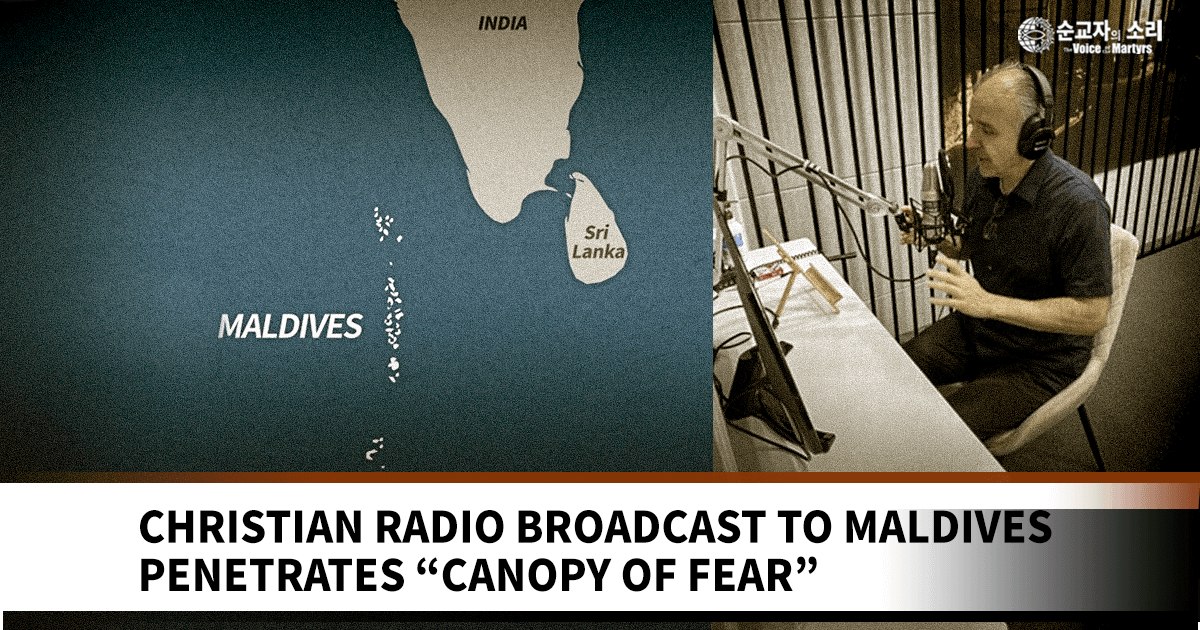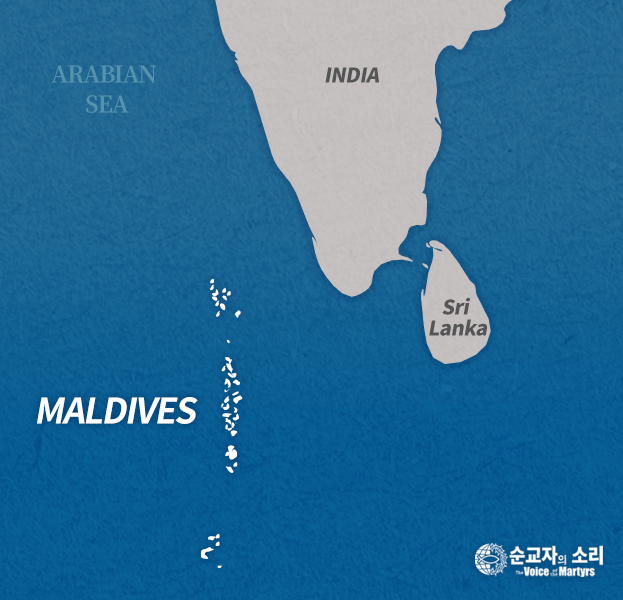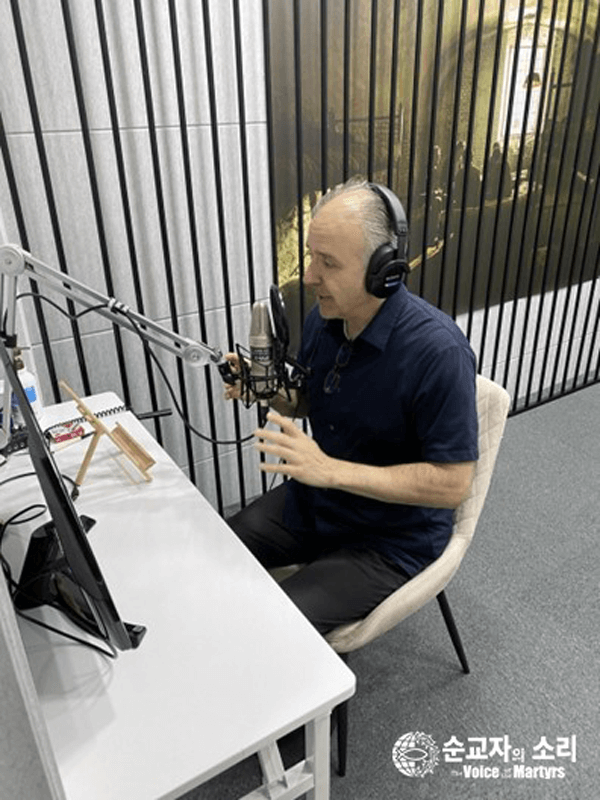
CHRISTIAN RADIO BROADCAST TO MALDIVES PENETRATES “CANOPY OF FEAR”

Announcing that the project had achieved all goals set for it in the eight months since first signing on the air, Voice of the Martyrs Korea today announced that it has renewed its annual broadcast signal lease and will continue its daily Christian shortwave radio broadcast into the Maldives Islands in 2023.
“Should the Lord permit, it is our intention to continue to broadcast the gospel message into the Maldives until Christ returns,” says Voice of the Martyrs Korea Representative Dr. Hyun Sook Foley, whose organization also operates 5 daily radio broadcasts into North Korea and 2 into China, aimed at supporting local Christians in those countries.
Representative Foley notes that while North Korea and China are better known for their extensive restrictions on Christian activity, the Maldives consistently ranks near the top in independent rankings of Christian persecution by religious watchdog agencies and governmental bodies.
“Neither mission work nor Christian literature has ever been allowed in the Maldives,” says Representative Foley. She notes that the Maldives’ constitution requires all citizens to be Muslim. “Conversion from Islam means that someone can be stripped of their citizenship and punished under Sharia law,” she says. “Even foreign workers who are Christians are closely watched, which makes church life extremely difficult and practically nonexistent. Churches are outlawed, and openly carrying the Bible is illegal. The country is so tightly controlled by Islamic law that there is not even a Bible fully translated into the native language of most citizens of the Maldives.”
Originally, Maldivians were Buddhists, but in the twelfth century Islam was proclaimed the national religion. Today, more than 97% of the 300,000 citizens of the Maldives report affiliation with Sunni Islam.
Representative Foley say a host of laws are designed to ensure that only Islamic principles are taught within the country.
“In order to deliver a sermon or a religious talk, one must obtain a license from the Ministry of Islamic Affairs (MIA),” says Representative Foley. “Only a Sunni Muslim with a degree in religious studies from a government recognized university may apply for a license.”

She notes that criticism of Islam is against the law, with punishments up to a year in jail.
“The definition of ‘criticism of Islam’ is very broad, with even the distribution of materials promoting another religion considered as criticism of Islam, even if the literature makes no mention of Islam at all,” she says.
According to Representative Foley, separate laws prohibit the distribution of Christian literature. Violations may result in a prison sentence of 2 to 5 years.
On July 6th, 2021, Maldivian authorities announced that an investigation had determined that Christian literature in the Dhivehi language, the native language of the islands, was being mailed to both individuals and companies in the Maldives. Some of the literature is believed to have been confiscated, but the government was unable to verify the origin of the literature and closed the investigation.
Other unconfirmed reports indicate that the Maldives may station government agents in nearby countries like Sri Lanka to monitor or stop Christian outreach to the Maldives from originating there.
According to Representative Foley, Maldivian Christians must keep their faith secret. “If they are discovered, they may lose their citizenship,” she says. “Even owning a Bible can result in imprisonment.”
Most Christians in the Maldives are expatriates, and most prefer not to organize meetings out of fear of repercussions. Representative Foley says that while the law does permit “non-Muslim” foreigners to live in the Maldives, they are forbidden from expressing their religious beliefs in public. Sharing the gospel with Muslims is illegal and can result in deportation.
According to Representative Foley, these factors combine to create a “canopy of fear” when doing any kind of Christian activity in or near the Maldives.
“Many Christian groups that normally work in ‘closed countries’ have not been able to do any kind of work in the Maldives,” says Representative Foley. “That’s why radio broadcasting is so important: It replaces the ‘canopy of fear’ with a ‘gospel canopy’—daily presentation of the gospel in ways that local Christians as well as mission agencies can rely on and build upon in their evangelism and discipleship efforts.”
But according to Representative Foley, the “canopy of fear” nearly smothered her organization’s efforts to launch the daily radio broadcast earlier this year. “One of our possible partners for the project was unable to secure radio airtime due to the relationship of the Maldivian government with their own government. And several potential announcers were ultimately too scared to have their voices heard over the radio, even though we planned to alter the voices digitally to make detection difficult.”

Voice of the Martyrs Korea CEO Pastor Eric Foley records a daily radio broadcast to the Maldives.
Nevertheless, she says, Voice of the Martyrs Korea decided to press ahead on its own, and it launched its daily shortwave radio broadcast to the Maldives April 1, 2022.
Representative Foley says that while the use of shortwave radio for the broadcast may sound old fashioned, it is actually a cutting-edge effort. “Recently the Maldivian government has increased its efforts to block Christian content on the internet and on medium-wave radio,” she says. Blocking shortwave is much harder. “A shortwave radio signal can also effectively reach the full 90,000 square kilometers and 1,000+ islands of the Maldivian archipelago, and it is much more difficult for the government to block on a regular basis.”
Representative Foley notes that as much as 25% of the Maldivian population has regularly listened to popular shortwave broadcasts in recent years.
For the security of listeners, Voice of the Martyrs Korea does not release information regarding local listenership. But according to Representative Foley, the program has not experienced any jamming by the Maldivian government.
“We have received many reception reports from all around the world – India, Philippines, Morocco, Japan, China, Germany, Australia, Austria, and the United States – confirming that our broadcast is being received,” she says. “Our engineers remain at full alert and are daily monitoring our Maldivian broadcast in order to counteract any jamming efforts that may arise in the future.”
Representative Foley says that the Voice of the Martyrs Korea’s daily broadcasts utilize a combination of Dhivehi language content and English language content. “We use several books of the Bible that have been translated and recorded in Dhivehi, as well as other Christian content that has been recorded in Dhivehi. We supplement this with English language content that we record in our radio studio. English is used in the Maldivian school system and is gaining popularity across the islands.”
Representative Foley raises two prayer requests as the daily radio broadcast to the Maldives begins its second year. “First, please pray for a continued strong and clear signal for the VOMK broadcast to the Maldives. Second, since it is too dangerous for Maldivian Christians to gather for worship in small groups, please pray that our broadcast can encourage Christians who feel alone.”
Those interested in donating to support Voice of the Martyrs’ daily radio broadcast to the Maldives can do so at www.vomkorea.com/en/donation or via electronic transfer to:
국민은행 (KB Bank) 463501-01-243303
예금주 (Account Holder): (사)순교자의소리
Please include the word “Maldives” with the donation.

